During the March 18-19, 2021 U.S.-China talks in Anchorage, Alaska, which were described by Washington as "tough and direct," CPC Political Bureau Central Committee member and Office of the Central Commission for Foreign Affairs director Yang Jiechi, who led the Chinese delegation, said that "the U.S. is not qualified to talk down to China," "Chinese people don't buy it," and "Stop interfering in China's internal affairs." His statements went viral in mainland China.[1]
Identifying a business opportunity, online stores in China began offering a wide range of merchandise with Yang's "patriotic golden sentences" – tee shirts, mobile phone cases, tote bags, umbrellas, and more
An article in the pro-China Taiwanese news outlet China Times wrote about the "patriotic commodity boom" in China, and noted that the Chinese are creating a demand for "red [i.e. communist] fashion customization," allowing consumers to design their own "patriotic merchandise."
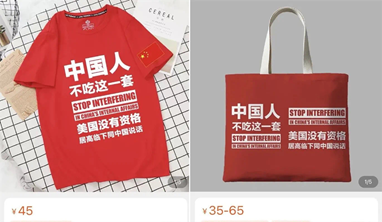
Tee and tote stating " Stop interfering in China's internal affairs" (Source: Chinatimes.com)
Below are excerpts from the China Times article:[2]
'The U.S. Is Not Qualified To Talk Down To China'
"Yang Jiechi, Director of the Office of the Foreign Affairs Commission of the CCP Central Committee, said at the Sino-U.S. talks that 'the U.S. is not qualified to talk down to China; Chinese people don't buy it!' The words caught the attention of the world, and the mainland netizens were even more enthusiastic about them. The mainland media made memes of the words and went viral on the Internet. Nimble merchants immediately printed them on tee shirts and a wide variety of merchandise and sold them online, causing people to rush to buy them. There has been a lot of discussion on the Internet. Some people think these merchants are quick to make 'patriotic money,' while others think that it is not advisable to do business in the name of false patriotism.
"Yang Jiechi... recently responded aggressively to the U.S. delegates at the high-level strategic dialogue between China and the U.S., [in statements that not only became] popular on the Internet, but also set off a trend of 'red fashion customization.' Seizing the opportunity, merchants rushed to sell tee shirts, mobile phone cases, canvas tote bags, umbrellas, and a wide variety of merchandise printed with the slogan 'Chinese people don't buy it!' via online stores, triggering a patriotic commodity boom.
"Mainland media quoted some online shop owners as saying that many customers have come to ask if they can order relevant products after the high-level China-U.S. diplomatic talks on March 18. Predicting a new fashion for patriotic customization of these products, dubbed 'Bully China Talk,' they rushed to get them on the shelves..."
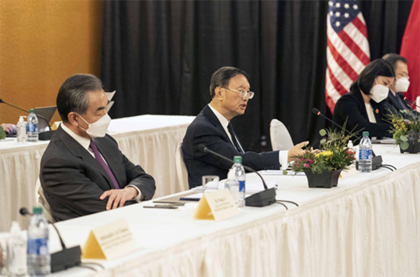
Yang Jiechi speaking at Sino-U.S. talks in Anchorage, Alaska. (Source: Xinhua)

Merchandise. (Source: Lihkg.com)

Merchandise. (Source: Lihkg.com)
'Stop Interfering In China's Internal Affairs'
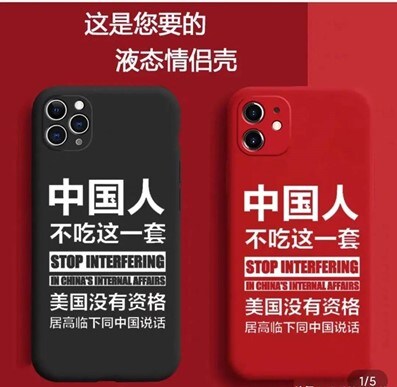
(Source: Chinatimes.com)
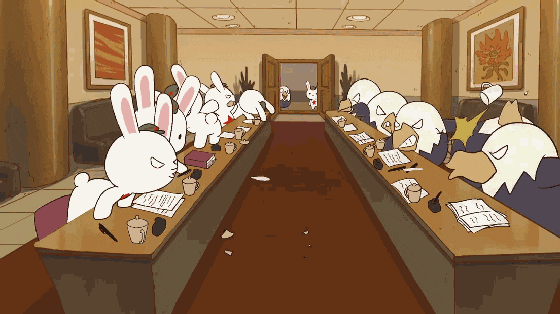
A GIF that went viral on Chinese social media: hares and eagles quarrel at the negotiating table in Alaska. The video was based on the Chinese animated series "Year Hare Affair" (Source: Globaltimes.cn/page/202103/1218897.shtml, March 19, 2021)
"In this series of 'patriotic golden sentences,' Yang Jiechi's 'Chinese people don't buy it' at the China-U.S. talks is the most popular, while others include 'The U.S. is not qualified to talk down to China,' the English words 'Stop interfering in China's internal affairs,' and so on. The price of these tees ranges from 35 to 60 RMB yuan [USD 5-9], shopping bags cost 50 RMB yuan [USD 7.5]. Other products in the series are equally varied and all cost more than similar products, with some netizens commenting that 'patriotism does have to pay more.' Some online vendors also claim to be able to customize, for example, mobile phone cases or other personalized items, with text fonts and colors tailored to customer's needs.
"Some [Chinese microblogging website] Weibo users pointed out that these sellers can be called patriotic businessmen, but some other netizens believe that using the name of patriotism to conduct business is not acceptable and should be boycotted. In addition to Yang Jiechi's golden sentences, the related business tools also include a chart produced by People's Daily on its Weibo account, which compares the signing scene of the 1901 Boxer Protocol and the 2021 U.S.-China High-level Talks,[3] and is called 'Comparison of Two Xin Chou Years' to reflect that 'China is no longer a backward country invaded by the West in the past.'"
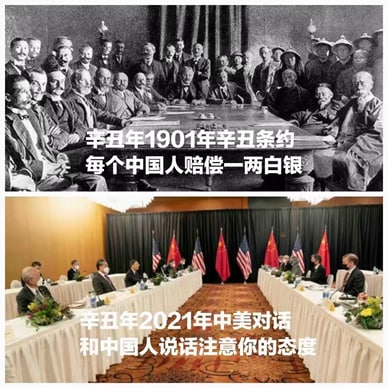
Scenes of the signing of the 1901 Boxer Protocol and the 2021 U.S.-China Alaska talks. (Source: Weibo)
[1] Yang Jiechi, former Chinese ambassador to the U.S., was nicknamed "Tiger" by President George H.W. Bush. Washingtonpost.com/archive/politics/2001/07/06/a-former-interpreter-finds-the-right-words/0fbbcd80-7cdc-417d-989d-45c4ac30a0c8, July 6, 2001. See also MEMRI Special Dispatch No. 9245, At U.S.-China Meeting, Top Chinese Diplomat Yang States: The U.S. Launches Wars, Whereas China Promotes Peace; The U.S. Should Stop Advancing Its Own Democracy In The Rest Of The World And Focus On Its Own Human Rights Record, March 22, 2021; MEMRI Special Dispatch No. 9249, Chinese Foreign Ministry On U.S.-China Meeting: Our Development Cannot Be Achieved Without CCP Leadership; The U.S. Should Have 'A Correct View Of China's Influence On The World,' March 23, 2021
[2] Chinatimes.com/realtimenews/20210321002581-260409?chdtv, March 21, 2021.
[3] The CCP media outlet Global Times wrote: "The Alaska talks reminded some netizens of the early 1900s, when China was too weak to get any respect. They forwarded two photos... which respectively depicted the signing of the unequal Xinchou Treaty (Boxer Protocol) between the Chinese delegation and Western invaders in 1901, and the latest Sino-U.S. Alaska meeting. 'In 1901, the Xinchou Treaty forced every Chinese to pay the invaders 50 grams of silver; but now in 2021, our diplomats directly said to their U.S. counterparts that they are not qualified to speak to China [arrogantly],' read the words on the two pictures, implying that China is no longer the bullied country of 120 years ago. 'It's good to see our diplomats 'warn' the U.S. politicians,' one user wrote. 'I truly feel the days when we were poor and weak are gone forever.'" Globaltimes.cn/page/202103/1218897.shtml, March 19, 2021.





